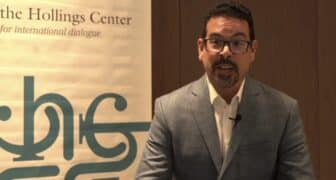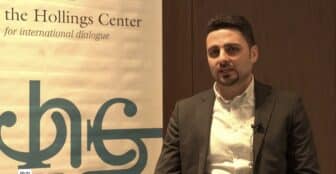Will politics cloud out Turkey’s renewable energy future? Speaking to the Young Professionals in International Relations (YPIR) Network, experts from academia, the private and non-profit sectors shared their insights on the messy politics of clean energy in Turkey.
In Turkey and around the world, an increasing number of people, including corporate leaders and policy makers, acknowledge the threat of climate change. Concern for the planet, coupled with anxiety over rising fuel costs, has sparked a global conversation over issues at the intersection of energy and the environment. But when it comes to Turkey’s efforts to encourage renewable energy solutions, is it all just politicians blowing hot air? The answer depends, according to Dr. Oksan Bayulgen, a political science professor at the University of Connecticut and the author of an soon-to-be-released book that approaches this very question.
In a July 3rd talk titled, “Two-Steps Forward, One-Step Back: How Politics Dim the Lights on Turkey’s Renewable Energy Future,” Dr. Oksan Bayulgen shared with members of the Holling Center’s Young Professionals in International Relations (YPIR) Network insights she gleaned from years researching the complicated politics of clean energy in Turkey. Joining Dr. Bayulgen and enriching the subsequent discussion were Özgür Gürbüz, an experienced environmental activist and the Communications Director for Turkey’s branch of the World Wildlife Fund, and Alkım Bağ, an executive with Polat Energy, an Istanbul-based company specializing in wind power and a co-author with Dr. Bayulgen.
In the worldwide race to develop clean energy sources, “there are clear leaders and clear laggards,” noted Dr. Bayulgen. Understanding how countries move towards a clean energy future and getting a grasp of the hurdles that Turkey faces in this race was the guiding goal for her book. “Lots of the literature stops at policy,” she explained, and, yet, in assessing the prospects for the clean energy sector, it is the policy environment that will shape where Turkey goes down the road. In a sense, according to Dr. Bayulgen, the language of political science, terms like “coalition building” and “collective action problems” and “public goods,” matter just as much to the debate over renewable energy as the technical jargon around carbon emissions and kilowatt hours.
“As a social scientist, this is a huge puzzle to solve,” expressed Bayulgen to the YPIR members, a growing group of young professionals who work in an array of sectors and come from diverse national and cultural backgrounds. Bayulgen explained that as a country with a relatively young and urban population, Turkey has not only achieved some of the fastest rates of growth in the world, but within the OECD countries, Turkey’s growth rate in energy consumption is at the front of the pack. From 2013 to 2015, energy consumption growth averaged 4.5% a year. In the first decade of the 2000s, Turkey was second only to China in electricity demand increase. When it comes to the country’s trade account deficit, a recurring cause for concern in most analysis of Turkey’s economy, energy imports make up 81% of that gap. Factor in the strategic risks Turkey is taking by relying on neighboring Russia, Iran, and Iraq for its energy and you get a sense of the costs that accompany this dependence.
For all of the ways it in which Turkey finds itself in the hot seat when it comes to energy and environmental issues, Bayulgen highlighted that “the potential for renewable energy is there.” On the supply-side of the equation, some estimates of Turkey’s solar energy potential place it in the range of a staggering 380 terawatt hours. The country’s wind potential is estimated at 48 gigawatt hours. On the demand-side, Dr. Bayulgen shared figures that show 20-25% of energy consumption could be shaved if energy-savings tactics and tools were put into place.
In light of these statistics, why has the share of renewables in Turkey’s energy portfolio actually fallen since the 1990s? In essence, what are the forces pushing for or against the switch to renewables? To answer these questions, Dr. Bayulgen turned to the focus of her field and perhaps the root of Turkey’s renewable energy dilemma: politics.
The 2001 economic crisis jolted the Turkish government to take actions that had a lasting impact on the Turkish energy sector. One law, passed in 2001, unbundled the state energy sector and overhauled its regulatory regime. Some of Turkey’s World Bank financing during this period went towards renewable energy projects. Around and after this period, other key dynamics took hold. Among these was the rise of the Justice and Development Party, which came to power in 2002 and gained a degree of political capital and legitimacy that smoothed the way for renewable energy-promoting reforms, in part to assist the European Union accession process. Just as importantly, what Bayulgen deems a “consciousness of sorts” took hold amongst the Turkish public. Public opinion polling shows that civil society activism fueled a shift towards popular support for “green” policies, such as requiring utility companies do more to protect the environment, a measure that garnered 71% approval in one poll.
With this context in mind, Dr. Bayulgen brought YPIR members up to speed on the present-day challenges facing the Turkish renewable energy industry with insights elucidated by the perspectives of Ms. Bağ and Mr. Gürbüz. “The political context matters,” emphasized Dr. Bayulgen, noting that the clean energy transition is impeded by regulatory uncertainty, confusing licensing processes, and weaknesses in the state’s bureaucratic capacity. As Ms. Bağ added, a renewable energy law passed in 2005 was meant to spur investment, but delayed regulations and a discouraging licensing process are dampening investor interest. “On paper, everything’s great,” Dr. Bayulgen, but lip service on the part of government officials does little to mask a missing commitment to clean energy. “Turkey needs a political vision and steady civil society pressure,” that would grow the country’s renewable energy economy and be good for the planet.
Following Dr. Bayulgen’s presentation, the three experts fielded questions from YPIR members that ranged from the technical details of wind energy projections to the big picture issues of which countries serve as renewable energy models. Dr. Bayulgen offered Germany as a paragon of national renewable energy policy, but followed up that China, as a developing country, provides a more apt case-study. China’s “everything under the sun, including the sun” energy strategy has led to big-time investments in renewables, as it seeks to gain a competitive edge in that key, value-added industry. In response to a question on the relationship of oil prices and renewable energy, Mr. Gürbüz explained that the indirect costs associated with the health, social, and environmental effects of fossil fuels are often overlooked. Ms. Bağ pointed out the goods news, which is capital costs for renewables are falling, too. Nonetheless,“short-term interests can overpower long-term concerns” when the public’s overall support for green policies collides with acute sensitivity to price.
In response to a question on consequences of recent elections on energy policy, Mr. Gürbüz cautioned that, across each of the party platforms, there are more broad strokes than fine details. Meanwhile, policy developments in other countries, such as Spain, which recently reneged on its renewable energy subsidies, could influence the direction Turkish decision-makers take.
“The challenge for developing countries is that the energy sector is slow moving,” said Dr. Bayulgen. Overcoming dıstribution company opposition and moving past the institutional inertia will take time. Yet, as all three experts agreed, Turkey has its fair share of reasons and ways to bring about this clean energy shift. Summing up her outlook, Dr. Bayulgen said, “Turkey has a long way to go, and it’s moving slowly, but I’m optimistic.” One day, it could be renewable energy, not fossil fuel, that powers the Turkish economy, but this change will require a new policy landscape and Turkish decision-makers seeing the light. No magic flick of the switch can do just that.
Dr. Bayulgen and Ms. Bag’s book is due for release in Fall 2015.
About the YPIR Network
Launched in June 2014, the Young Professionals in International Relations (YPIR) Network is an innovative social and professional networking platform that connects young professionals, from across sectors, around a shared focus for “all things IR.” Overseen by the Hollings Center for International Dialogue, the YPIR Network has featured a range of programming linking young professionals with each other, and the ideas and thinkers at the cutting-edge of global affairs. For more information on how you can join, please contact Aslı Mutlu at asli.mutlu@hollingscenter.org.




